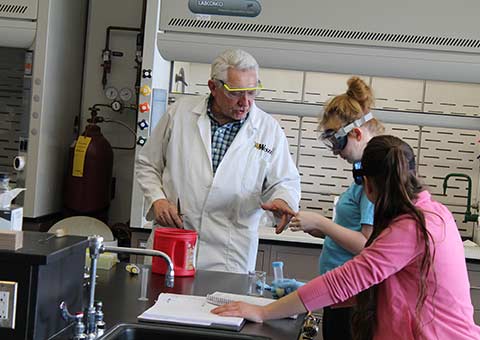Any of our majors can be taken with a Majors Honors Designation. To obtain this designation, applicants must meet three criteria: taking certain major classes with an honors designation (such as Inorganic Chemistry or Physical Chemistry), a few extra credits of Honors Colloquium (HON395) to experience a wide range of topics, and an Honors Thesis Project. Majors Honors may also be combined with General Studies Honors, as well, allowing students additional recognition for their achievement.
Obtaining an Honors designation for your degree is a sign that you have gone “above and beyond” the normal degree requirements. It allows you to stand out in a crowded field of your peers as a mark of a person who decided to take greater advantage of their college experience.
While at MWSU, being a member of the Honors Program grants the following benefits:
- Priority registration for classes
- Enrollment in Honors Colloquia, classes that discuss interesting and stimulating topics not normally found as a part of a student’s degree requirements
- Pursuit of membership in the Student Honors Organization
- Pursuit of membership in Alpha Chi National Honor Society
- Residence in the Academic Achievement floor in Vaselakos Hall
- Use of the Honors Lounge, Spratt 202
In addition, the Honors Thesis requirement is an excellent preparation for a M.S. or Ph.D. program, and the Honors designation on a degree can make an already strong application to a competitive professional school program just that much stronger.
But do you know what the real benefit is to obtaining an Honors designation on your degree?
Many chemistry students already fulfill many of the requirements for the Majors Honors program, in the normal course of their academic studies!
The majority of chemistry students:
- Participate in research projects under the direction of a faculty mentor
- Present their research results at regional or national conferences
- Write a research-style paper
All of these activities can blend very well with the requirements for the Majors Honors designation.
So why not take the few extra steps to get formal, documented recognition for work that you, most likely, are already going to do anyway?
A recommended timeline of events:
Year 1 or 2: Maintain a cumulative 3.5 GPA and complete Honors courses with an A or B.
| Majors Honors | Majors Honors & General Studies Honors |
|---|---|
| Seek out a department faculty mentor and begin discussing an honors research project.
Enroll in and begin completing 6 credits of Honors Colloquia (approximately 3 classes, 2-3 semesters, these do not have to be chemistry related) |
Seek out a department faculty mentor and begin discussing an honors research project.
Enroll in and begin completing 10 credits of Honors Colloquia (approximately 5 classes, 4-5 semesters, these do not have to be chemistry related) Take 6 courses of Honors section General Studies courses |
Year 2-3: In the semester before you start your thesis project, fill out the Majors Honors Approval Form with your faculty mentor and determine a thesis committee with your mentor’s help.
Begin working on your thesis project. This may be accomplished independently or for credit as CHE 490
Begin the TWO required major level courses with an honors designation. Many of these courses are already part of the major sequence and only require an honors designation.
Year 3-4: Complete your thesis project and thesis document, submit it for approval to the thesis committee. Submit your thesis to the Honors program with the Majors Honors Progress Report.
Present your research at a national or regional meeting (or submit it for publication).

